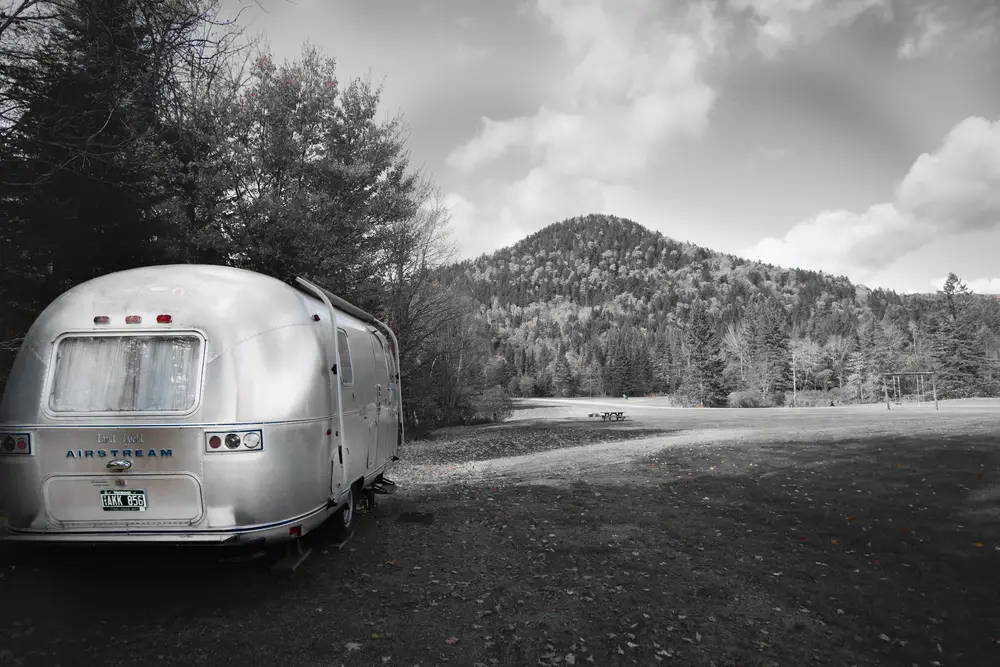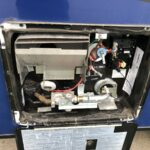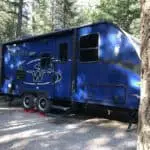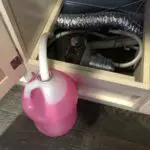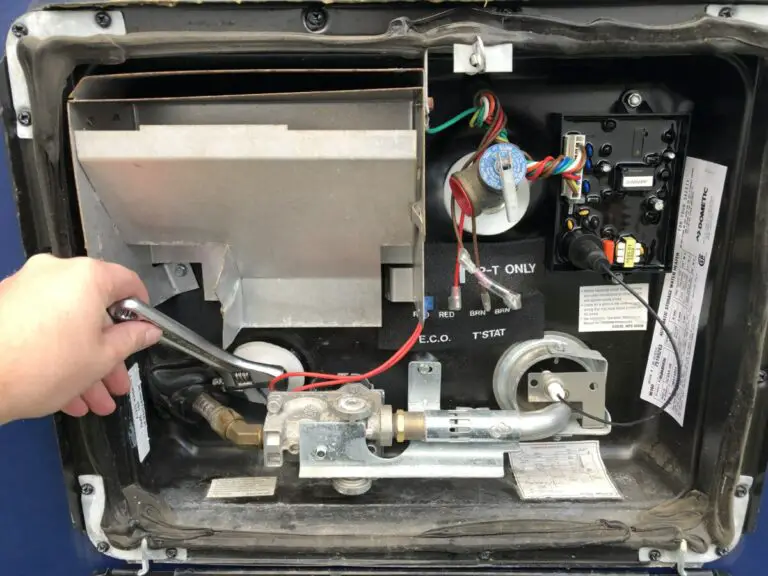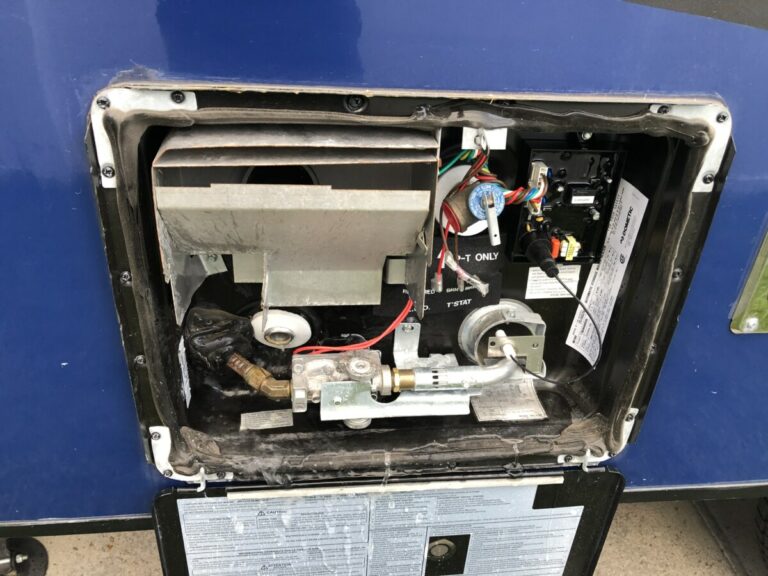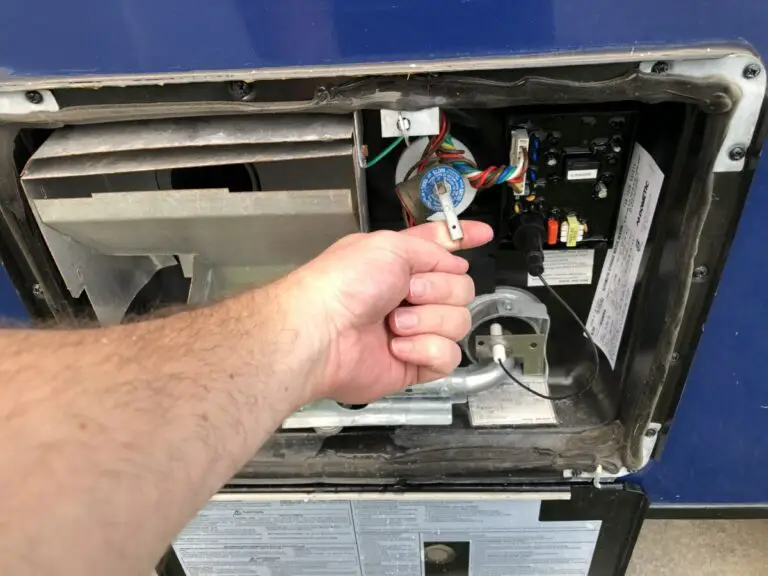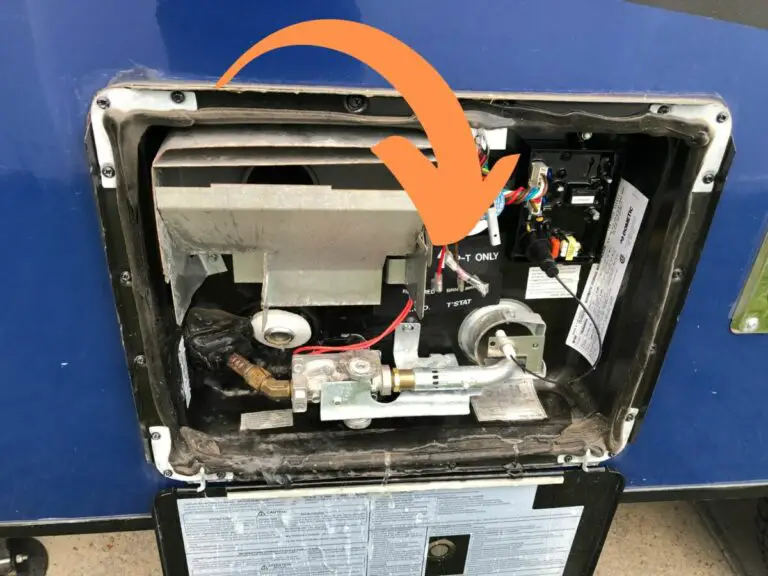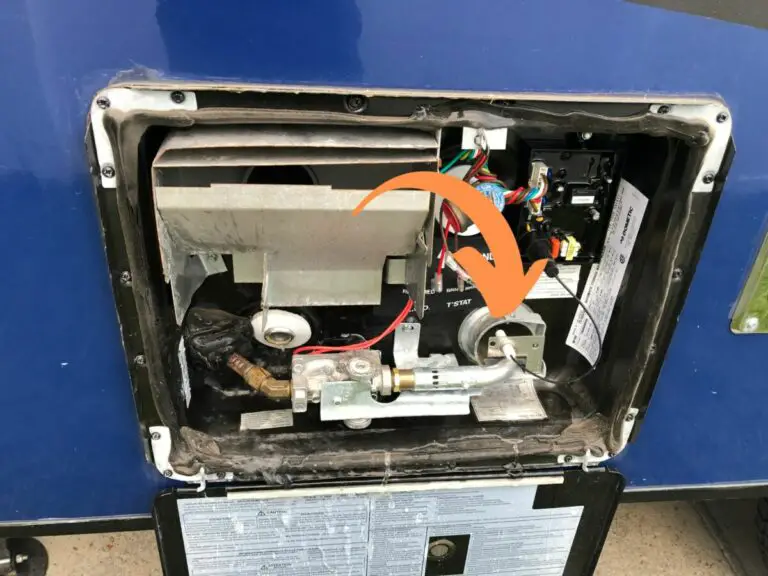What Happens If A RV Water Heater Freezes: Consequences and Prevention Tips
A RV water heater freeze up can be a real headache for you as an RV enthusiast, especially during the colder months. One of the most unpleasant side effects is the potential for damage to your RV’s water system. In order to prevent such instances and understand what happens if your RV water heater freezes, we’re going to dive into the topic and provide some informative details.
When an RV water heater freezes, the water inside it turns into ice, expanding and exerting significant pressure on the tank resulting in cracks, leaks, and complete failure of the tank itself. Also, your plumbing system pipes and fittings may also suffer damage due to the expansion of the ice.
Keeping your RV water heater in top condition is essential for your comfort and peace of mind during your travels. Understanding the risks associated with freezing and how to prevent it can save you a lot of trouble in the long run. Make sure you take the necessary precautions to avoid a freezing scenario and protect your investment.
What Actually Will Happen when An RV Water Heater Freezes
As your RV water heater freezes, there are clear signs it is frozen.
- The amount of water from a faucet is patchy. This is because parts of the water system are frozen solid, preventing regular flow and the necessary pressure.
- If the water heater found on the RV’s exterior is covered in an icy film, chances are, the water heater is frozen.
- Due to the expansion and contraction of frozen pipes, they make noticeable banging, clanging, and gurgling sounds.
- The water tank’s body and lines begin to crack from the pressure caused by freezing.
As water freezes, it expands. Unfortunately, your RV system can’t accommodate the large mass of frozen water.
Unfortunately, it’s too late to remedy the problem at this stage. The internal damage is significant and unsalvageable.
You’ll need to call a professional plumber and replace your entire water system. This is very expensive and can cost up $8000.
Dealing with a Frozen RV Water Heater
Identifying Frozen Water Heater Components
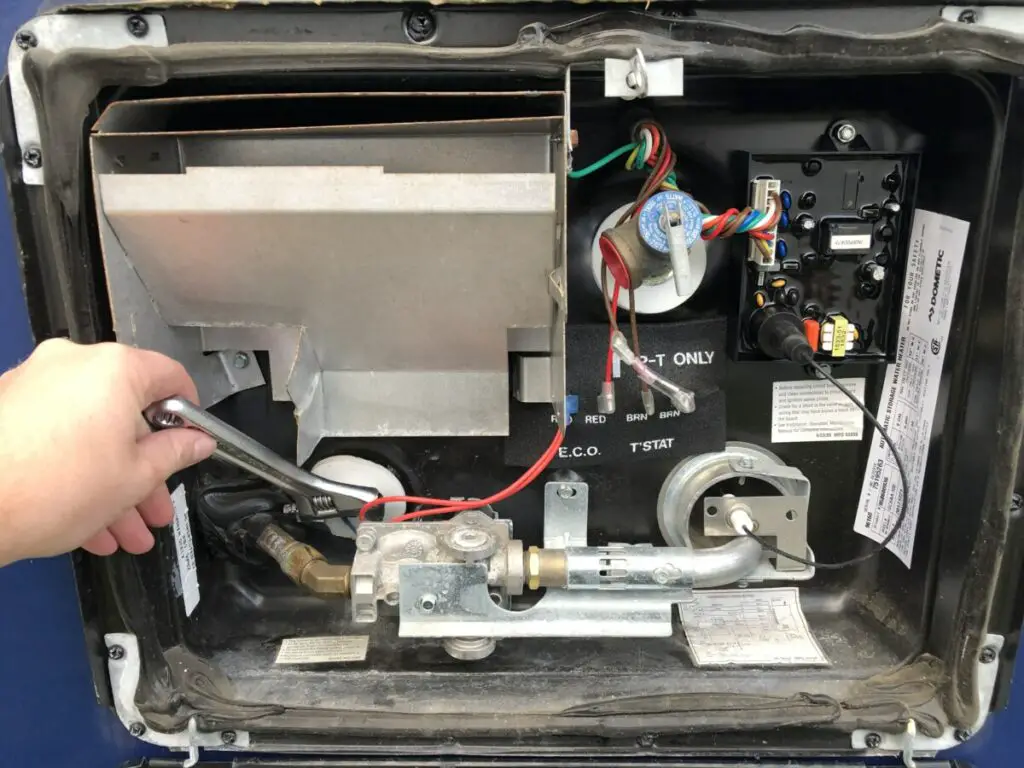
First, check your RV water heater and its pipes for signs of freezing. If you notice frost, ice, or bulging in the pipes, it is likely that they have frozen. You may also experience reduced or no water flow when turning on your faucets. In such cases, it’s essential to act quickly and address the issue to prevent further damage.
Steps to Thaw Frozen Pipes and Water Lines
To thaw your frozen pipes and water lines, follow these steps:
- Turn off the main water supply – This will prevent more water from entering the frozen pipes and causing additional pressure buildup.
- Open faucets – By opening faucets, you’ll help release any pressure in the pipes and allow water to flow out as it thaws.
- Apply heat gently – Use a hair dryer, heat lamp, or portable electric heater on the affected area. Remember to keep your heating device away from flammable materials, and never use an open flame.
- Insulate the area – Wrap the exposed pipes with insulation, heat tape, or even towels to help retain the heat while thawing.
- Monitor the pipes – As you apply heat, keep an eye on the pipes to ensure they are gradually thawing and to detect any leaks.
Assessing the Damage After Thawing
Once the frozen pipes and water lines are thawed, it’s crucial to inspect your RV water heater for any potential damage. Check for cracks, leaks, or burst pipes, and be sure to examine the water heater itself for any visible damage. If you find any issues, it’s best to consult a professional technician or your RV manufacturer for guidance on repairs or replacement. Maintaining your RV water heater and ensuring it’s in good condition will help prevent future freezing incidents.
How To Prevent Your RV Water Heater From Freezing
If you are using your RV in freezing Conditions:
Insulating Water Lines and Pipes
Insulating your water lines and pipes is crucial in maintaining a stable temperature and avoiding freezing. You can use foam pipe insulation to wrap around your water lines, providing added protection against cold temperatures. Make sure to cover all exposed pipes, especially those running in colder areas like the underbelly or storage compartments. Additionally, consider adding insulation pads or blankets to the water heater itself to help retain heat.
Add a heater to the Water Heater Compartment
If you have enough room, you may need to add a heat source such as a 60 watt lightbulb to keep the area where your water heater is located heated to prevent freezing. Make sure not to use a newer LED bulb, but an incandescent bulb that will produce some heat.
Use of Antifreeze in RV Water System to Winterize your RV Water Heater If Not In Use
Using RV antifreeze in your water system is another effective way to prevent freezing. This non-toxic antifreeze is specifically designed for RVs and can be used to replace the water in your lines, protecting them from freezing in cold temperatures. To do this, follow these steps:
- Turn off your water heater and allow it to cool before proceeding.
- Ensure all water has been drained from the system (as mentioned in the winterizing section).
- Connect an RV antifreeze pump to your water inlet or use a gravity feed system.
- Turn on the pump or open the antifreeze container.
- Open each faucet in turn, starting with the one closest to the water inlet, until you see the antifreeze flowing. Make sure to flush both the hot and cold water lines.
- Don’t forget any exterior faucets or showers – they are also susceptible to freezing.
By following these steps and combining winterization, insulation, and antifreeze use, you’ll be able to protect your RV’s water heater and plumbing system from freezing, ensuring a hassle-free winter season.
This is just a quick method, for a full tutorial on how to winterize your water system in your RV, find out how to winterize your RV in our in depth article. Read this article if you have to winterize a tankless RV water heater.
More Tips And Tricks To Winterize Your RV Water Heater
Here are a handful tips and tricks to winterize and protect your RV water heater:
Keep your RV at room temperature– This overlooked tip is valuable- as your RV water lines run beneath the underbody of your RV. Generating extra warmth goes far in protecting your entire system.
Most RV’s have underbelly heat when their furnaces are running. If you have electric heaters in your RV and aren’t running your furnace, your underbelly is getting no heat, therefore it will freeze.
There are several ways to maintain heat. For example, insulate wherever possible, supplement your RV heating system, don’t park in the shade/under trees, and preserve fuel and energy.
Insulate your water heater with spray foam. This is a helpful trick to keep the water heater at an even temperature. Online tutorials illustrate the processes of insulating your water heater with spray foam. Additionally, you can buy insulating foam sealant online for about $8. Spray foam brands include Kwik Foam, Great Stuff, Loctite, and Liquid Rubber.
Apply a RV Tank Heating Pad- A tank heating pad consists of tiny electric resistors that generate small amounts of heat. This is an effective method to prevent your water heater from freezing. Getting a pad with a thermostat that adjusts the temperature overnight preserves energy.
RV Water Heater Maintenance During Winter Months
During the winter months, it’s essential to take extra precautions to maintain your RV water heater to prevent freezing and potential damage. Proper maintenance will ensure a functioning water heater throughout the cold season.
Frequent Holding Tank Inspections
Regularly check your RV’s holding tanks for signs of freezing. When temperatures drop, the water inside can freeze, leading to complications such as obstructed water lines and potential tank damage. To avoid these issues, keep the tanks insulated and consider using tank heating pads. Check the tanks at least once a week for any signs of freezing or damage, and take preventive measures like:
- Draining the tanks before winter storage
- Using antifreeze solutions designed for RV water systems
- Emptying the tanks and turning off the water supply during extended periods of non-use
Regular Water Heater Inspections
Inspecting your RV water heater should be an essential part of your winter maintenance routine. You’ll want to ensure that it’s well-insulated and free from defects or malfunctions. Keep the following tips in mind as you conduct inspections:
- Check for any visible leaks or damage on the exterior of the water heater. Look for cracks and punctures, and repair or replace damaged parts as needed.
- Inspect the water heater’s insulation. If it’s insufficient or damaged, add more insulation to prevent freezing and help keep the unit functioning efficiently.
- Examine any water lines connected to the water heater for signs of freezing or damage. If ice has formed in the lines, use a heat source, like a hairdryer or a safe space heater, to thaw them.
- Monitor the temperature of the water inside the heater regularly. If it’s consistently below freezing, or if you notice significant fluctuations in temperature, it may be an indicator that your water heater requires further inspection or maintenance.
By keeping these maintenance tasks in mind, you can ensure your RV water heater remains functional and efficient throughout the winter months, helping you avoid freezing and potential damage to your system.
Troubleshooting and Additional Protection Measures
DIY Insulation Options
To prevent your RV water heater from freezing, consider insulating the water heater and nearby pipes. You can use pipe insulation sleeves or foam tape to wrap your pipes and prevent heat loss. Additionally, insulate the water heater itself by adding a specially designed water heater blanket. This will not only protect your water heater from freezing temperatures but also improve its efficiency.
Effective Vent Maintenance
Properly maintaining your water heater vents can also help prevent freezing. First, check for any signs of corrosion on the vents, as this can reduce the functionality of your water heater. Clean and repair any corroded areas promptly to avoid further damage. Next, ensure your vents are clear of obstructions, such as debris or insect nests. Open and close the vents as needed to regulate airflow and prevent overheating.
Managing Pressure and Temperature
Monitoring and adjusting the pressure and temperature of your water heater can play a crucial role in preventing freezing. Start by familiarizing yourself with your water heater’s thermostat settings. Adjust the temperature as necessary to ensure it is within the appropriate operating range. If you suspect that there might be a problem with pressure buildup, invest in a reliable pressure relief valve to protect your water heater from potential damage. Using a heat gun can also help you identify areas where insulation may be inadequate, allowing you to address them accordingly.
Remember to follow these troubleshooting and additional protection measures to keep your RV water heater in optimal condition, even in freezing temperatures. Your proactive approach will save you time, money, and headaches in the long run.
Safe Winter Camping with an RV
Operating the RV Water Heater
During winter camping, it’s essential to operate your RV water heater properly to prevent it from freezing. Make sure to keep the water temperature at a safe and steady level. If you’re not using your hot water regularly, turn off the heater to save energy and avoid potential damage. Always keep an eye on the weather to ensure your water heater stays functioning in the cold.
Draining and Flushing the System
When traveling, it’s important to drain and flush your RV water system to prevent freezing. Regularly check the water lines, and if you notice any signs of freezing, take action immediately. To drain the system:
- Turn off the water heater and let it cool down.
- Open the faucets and drain valves to release the pressure.
- Drain and flush the water heater.
- Insulate exposed water lines to prevent further freezing.
Using RV Antifreeze Safely
Using RV antifreeze is an effective method to protect your water lines from freezing during cold temperatures. Keep these tips in mind when using antifreeze in your motorhome:
- Always use non-toxic RV antifreeze, specifically designed for potable water systems.
- Never mix different types of antifreeze.
- Follow manufacturer’s instructions for the recommended amount of antifreeze.
- Remove the water filter before adding antifreeze to the system.
- Run the pump and faucets until antifreeze is visible.
By following these guidelines and maintaining your RV water heater system, you can confidently enjoy winter camping and traveling in your motorhome without worrying about freezing issues.
Frequently Asked Questions about RV Water Heaters Freezing
How can I prevent my RV water heater from freezing?
To prevent your RV water heater from freezing, you can insulate it with a water heater blanket or foam insulation. You can also install an electrical heating pad designed for RV water heaters that will keep it warm during cold weather. Additionally, try to park your RV out of direct wind, as this can contribute to freezing.
At what temperature do camper water lines freeze?
Camper water lines can freeze when the temperature drops below 32°F (0°C). However, the exact temperature at which your water lines will freeze depends on the insulation, type of RV, and locations of the water lines.
How do I keep water lines in my camper from freezing?
To keep water lines in your camper from freezing, wrap them with insulation or use heat tape specially designed for use on water lines. You can also keep your RV’s temperature above freezing by running your furnace or using an electric space heater.
Can freeze damage occur in an RV water heater?
Yes, freeze damage can occur in an RV water heater if it freezes. The expanding ice from the freezing water can cause damage to the water heater tank, plumbing, and fittings, leading to leaks or breakage.
How do I unfreeze a frozen RV water heater?
To unfreeze a frozen RV water heater, first, turn off the water supply and disconnect the power source to avoid potential damage. Then, gently warm the frozen area with a hairdryer or a portable space heater. Be sure to use low heat settings and always monitor the process to prevent overheating or damage.
What measures can I take to protect my RV water pump from freezing?
To protect your RV water pump from freezing, you can make sure it’s well-insulated by wrapping it with insulation or using a heat pad designed for pumps. Also, draining the water system when the RV is not being used during cold weather can help prevent freezing.
Conclusion
If your RV water heater freezes, it will result in irreparable and costly damage. You’ll need a professional plumber to replace your entire water system. In contrast, taking preventative measures to winterize your RV is simple and affordable. Use about two gallons of RV antifreeze with a water pump converter kit to protect your drains, pipes, tanks, and plumbing.
Be the first to be notified about FREE tips, hints, coupon codes, and email-exclusive information. All for FREE!

